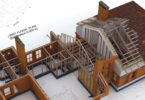It’s an online world, but printed handouts are more relevant than ever—use them to stand out from the competition
By Eric Schoeniger
When Chrissy Ward, CRS, moved to a new neighborhood, she decided to go door knocking. An experienced REALTOR® with Keller Williams Seven Hills Realty in Cincinnati, she knew how to make the technique pay off.
She created a one-page, two-color handout listing recently sold homes in the neighborhood, including prices and number of days on the market. She assembled 100 small bags that included the handout, her business card and a box of Girl Scout cookies. Then she loaded the bags into a wagon and began walking door to door.
A week later, she won a $540,000 listing as a direct result of her efforts.
The cookies could have had something to do with it. But successful agents agree that even in an era of websites and mobile apps, printed handouts have a big impact.
“The tried-and-true approaches need to be re-examined,” Ward believes. “Not everyone is on social media. Handouts remain an effective tool for selling.”
Show of handouts
Handouts come in all shapes and sizes, but the most effective fall into these categories:
Homebuyer packet—A homebuyer packet includes handouts that cover:
- The benefits of working with you.
Insights into the current market. - Client testimonials.
- State-specific agency agreements and buyer representations.
- An overview of the buying process, including offer, mortgage, home inspection and title.
“A homebuyer packet helps buyers understand the process and what you want them to keep top of mind,” says Rich Sands, CRS, a Certified RRC Instructor.
Prelisting packet—Equally important is a prelisting packet.
“Every agent should have a prelisting packet they give to sellers,” Sands says. “It informs sellers what they need to focus on prior to the listing appointment, and it helps them understand how you work as a listing agent.”
Property brochure—For higher-value properties, a printed brochure with listing details and glossy photos is invaluable.
Ward, for example, has a four-color document professionally printed on a folded 11- x 17-inch sheet.
Community information—Assemble handouts with local details such as schools, grocery stores, restaurants, parks and trails, and wireless carriers. Government offices and chambers of commerce can be useful sources.
“If there’s something unique about the neighborhood, such as a community swimming pool, I’ll include the hours and costs,” says Beth Caster, CRS, a broker for Berkshire Hathaway Home Services in McMinnville, Oregon.
Market data—Maintain up-to-date lists of relevant market statistics such as recent sales in the area and mortgage interest rates.
Lists—Caster likes to hand out tips for both buyers (get preapproved, communicate nonnegotiable needs) and sellers (remove prescription drugs, deodorize if you have pets). She also provides lists of contractors, painters and landscapers.
(For more list ideas, see the sidebar “A List of Lists.”)
Updating handouts for the digital era
Keep handout content up-to-date. If interest rates change, update your market-data handout. If a seller repaints, update your property brochure.
Likewise, make sure your handouts remain relevant in our online age. “People are inundated with information today,” says Sarah Marrinan, CRS, a REALTOR® with Keller Williams in Vadnais Heights, Minnesota. “Young people especially are less apt to read long pages of information. Keep your handouts simple.”
With that in mind:
- Use bullet-point lists.
- Keep text short.
- Include relevant photos.
- Employ lots of white space.
If you have the skills to create your own handouts, you can save money. If not, “don’t waste time inefficiently designing handouts when you could be making calls or meeting with buyers,” Sands says.
Most important, make sure your handouts are integrated with your online marketing efforts. For every printed handout you create, you should have an electronic version that you can email to clients and that clients can download from your website.
A bird in the handout
Different handouts work better in different contexts. For example, Ward offers handouts to buyers at open houses—but only if they leave behind their name, phone number and email address.
Marrinan focuses on handouts that reduce buyer and seller stress. “I give clients a folder with handouts on topics such as financing and moving checklists,” she says. “Then when we get to that step in the process, I email the relevant handout info to remind them.”
In fact, it’s a good idea to use process steps as a trigger for handouts. “In Minnesota, as soon as we talk about pricing terms and conditions, we have to present an agency disclosure,” Marrinan says. “So I use that as an opportunity to provide a flyer about what makes a CRS better.”
To that end, RRC makes available a range of handouts to CRS Designees. “The RRC flyers are valuable because they clearly explain why homebuyers and sellers should be working with a CRS,” Marrinan says. Other RRC handouts cover topics such as pricing a home and relocating. They can be customized with agent details.
Such customization is key. “You should always personalize your handouts for the recipient,” Sands says, “and customize them for their specific needs.” For a first-time homebuyer, provide a handout on the buying process. For a relocation client, offer a handout about the local community.
The goal is to connect with the client. “You could use a super-deluxe brochure or a printed sheet of paper,” Ward says. “As long as your handouts show that you know how to serve your clients, they’ll be effective. You’ll build relationships and you’ll get listings.”
Meet your Designation Maintenance Requirement today! Read this article and “A Fair Deal,” take a 10-question quiz and earn 2 credits. Go to CRS.com/trs-quiz to get started.
A List of Lists
Top tips lists are a great way to give clients valuable information. Some ideas:
For Buyers
• Ways to Improve Your Credit Score
• Tips for Buying in a Tight Market
• Common Homebuyer Mistakes
• Home Defects to Look Out For
• Closing Costs for Buyers
• Problems to Look for on a Final Walkthrough
For Sellers
• Rooms to Remodel That Pay Off
• Qualities to Look for in a Remodeler
• Ways to Give Your Home Curb Appeal
• Low-Cost Ways to Stage Your Home
• Ways to Prepare for an Open House
For Buyers and Sellers
• Qualities to Look for in an Agent
• Techniques for Holding a Great Yard Sale
• Tips for Packing Home Belongings
• Questions to Ask a Mover
• Things to Do Before You Move








